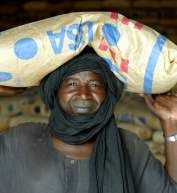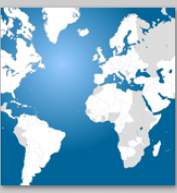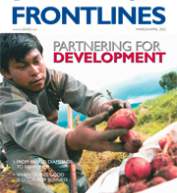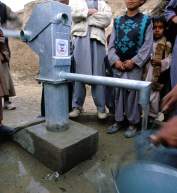Speeches
We prize our partnership with your University, as well as your graduates who have joined USAID, making a real difference in the lives of others.
I plan to discuss today an approach to meeting food and health needs through the water programs developed and implemented by USAID and its partners.
More specifically, I would like to cover how we utilize a certain set of tools and approaches , catalysts if you will, which we believe will provoke and speed and action towards the overarching goal of saving and improving lives.
These tools are derived from open source based development, partnerships and finance, science and technology, and integrated programming. They all help catalyze the development and implementation of solutions.
At USAID, we have an expression: If you want to change the world, invest in a girl. If a girl stays in school, remains healthy, gains real skills, and is safe from sexual and other physical abuse, she will marry later, have fewer but healthier children, earn a higher income that she will invest back into her family, and she will break the cycle of poverty in her family and her community.
She’ll use her education to increase agricultural production, improve health conditions for her family, adapt better to natural disasters and droughts, and serve as a leader to resolve local and national and even international conflicts.
This isn’t theory: It is fact. Let me cite just one statistic: In Africa, most young girls are likely to become farmers—if we could guarantee that these girls and women had access to the same level of education, credit, entrepreneurship and other inputs that men have, it would increase agricultural production by 30 percent and feed 150 million people worldwide each year.
Two weeks ago, during the week of the U.N. General Assembly, President Obama spoke at the Clinton Global Initiative about the need to fight human trafficking, calling it on of the great human rights struggles of our time. “Everyone has a responsibility,” he said. “Everyone can take action.” Today, to help answer the President’s call, it is my honor to announce USAID’s Counter-Trafficking Campus Challenge: A unique competition that is expressly designed for students on campuses across the United States and around the world to generate cutting-edge ideas and new technologies to combat one of humanity’s greatest challenges.
As President Obama said, “We’re turning the table on the traffickers. Just as they are now using technology and the Internet to exploit their victims, we’re going to harness technology to stop them.” The challenge has several phases—and the first one begins today, as we encourage students to come together online at the new www.challengeslavery.org website to discuss the challenge and identify potential barriers to success.
Development attracts many of the best students, brightest minds and strongest spirits. Open-source development can help keep all of us inspired by offering the true reward of being successful—combining productivity with meaning.
When you bring your expertise, your ideas, your ingenuity to the task; when you can see that something you’re learning in a classroom is helping communities to withstand natural disasters, or when you commit yourself to a career in the service of others—those are deeply rewarding results for you—and millions of people everywhere.
Today we celebrate the historic partnership between the United States of America and the Republic of Malawi. At this ceremony we mark the signing of bi-lateral agreements between The United States Agency for International Development and Malawi’s Ministry of Finance and Development Planning for programs in education, health, economic growth, democracy and good governance. This cooperation is implemented through NGOs, international organizations and Government of Malawi partnerships that support Malawi’s own development priorities.
For more than 50 years we have worked together for the good of all Malawians. Throughout Malawi’s recent history I am proud to say that the United States has remained a steadfast partner as the largest overall donor.
Looking around the room, it’s clear that our university’s commitment to serving our nation and all nations has not changed one bit since John F. Kennedy’s legendary visit in 1960. President Kennedy’s impromptu remarks that day on the steps of the Michigan Union challenged students to give two years of their lives to help people in the developing world.
He inspired a movement on campus that led to one the most remarkable service projects in American history, the Peace Corps. That was over fifty years ago. Before the Foreign Assistance Act, before even the U.S. Agency for International Development, there was you.
Since then, the University of Michigan and the Ford School of Public Service have embraced their role as leaders in the global effort to tackle the greatest challenges of our time. You are the number four all-time contributor to Peace Corps, with a total of more than 2,450 volunteers since 1961.
This is an exciting and important time for development. We’re beginning to see incredible results taking shape—results that aren’t just impacting individuals or communities, but entire nations. El Salvador has achieved 96 percent primary school completion rates for boys and girls—up from 81 percent 10 years ago. In Ethiopia, in the last six years, under-5 mortality has fallen by almost 30 percent—thanks, in part, to efforts to empower 30,000 community health workers with live-saving tools.
And in Afghanistan—probably one of the hardest places on earth to see clear development results—we’ve helped reduce maternal mortality to one-fifth of what it was a decade ago and expand basic services from only 6 percent of the country to 64 percent. Some of these results have brought us above and beyond our MDG targets, as we’ve seen this past year, when the world met the goals of reducing poverty by 50 percent and halving the proportion of people without access to clean drinking water.
We are here not only because we have a deep appreciation of the importance of food security, but also because we understand that hunger and undernutrition have a long-term impact on our nations’ health, economies and security.
Around this time last year, the worst drought in 60 years had put more than 13.3 million people at risk across the Horn of Africa
At the same time, a similar emergency was building across eight nations in the Sahel, where a devastating combination of drought, conflict and displacement was affecting millions. Last November—even as we were responding to the crisis in the Horn—we began sending humanitarian supplies to the Sahel.
Remarks as Prepared
It is a pleasure to join you today, because I believe we have a real opportunity at this moment in development. For decades, our community has talked about the importance of building community resilience to perennial disasters, like droughts and floods.
But every year, as many as half of our emergency workforce mobilizes to East Africa. And every year, communities from the Horn of Africa to the Sahel brace for a possible season of lost livelihoods—a season of starvation.
We know that more than 90 percent of the adult population in the developing world is unbanked. And more than 2 billion of these unbanked individuals are already using mobile phones in deeply innovative ways. In fact, I’ve seen the real potential for this work myself not far outside of Nairobi, where I met a dairy farmer named Gitau who didn’t have access to the electric grid or running water. But by using a mobile phone app called iCOW, he could invest in his business, vaccinate his animals, improve their feedstock, and track milk output and local prices. “Information is power,” he told me.
There’s an exciting opportunity here for those of us working in this field. An opportunity to usher in a new era of development by forming public-private partnerships that change the way we do business—while expanding opportunity to millions. That’s why we came together to build a network called the Better Than Cash Alliance—to accelerate the adoption of electronic payments around the world and to bring electronic payments and mobile money into our USAID programming with an eye towards greater gender equality and financial inclusion.







Comment
Make a general inquiry or suggest an improvement.